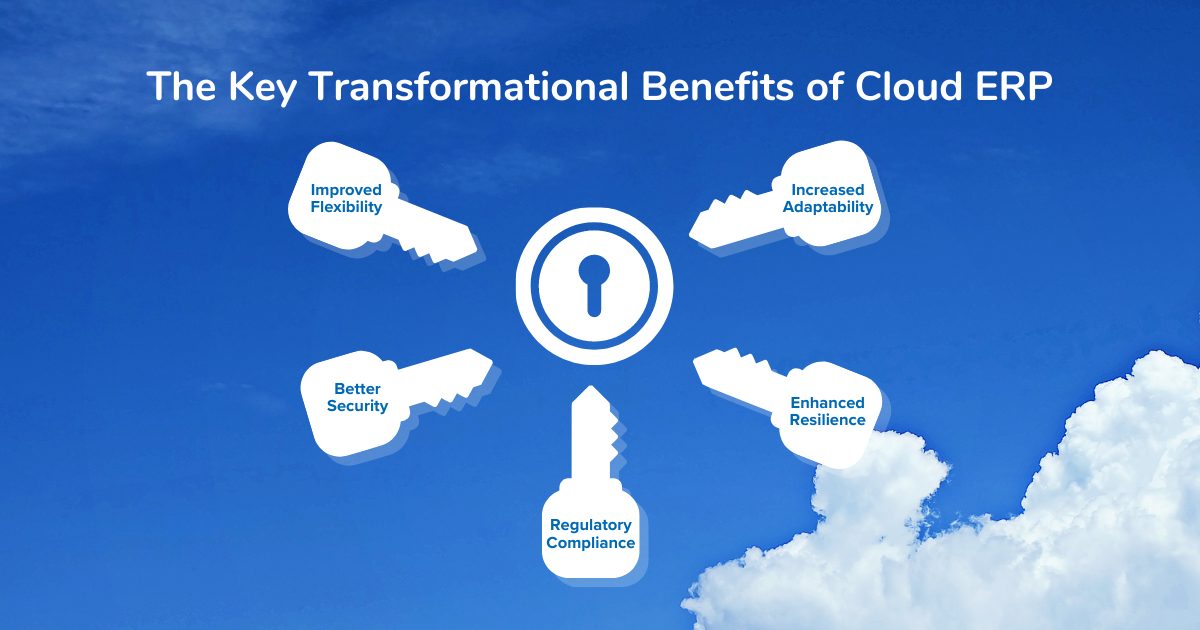Voor bedrijven zoals Milne Agrigroup, Hypex Electronics, KLINGER en Steel Blue heeft het begrijpen van het verschil tussen ERP-functies en ERP-functionaliteiten, en het afstemmen van ERP-functies op hun specifieke operationele behoeften, hen in staat gesteld om de volledige kracht van hun ERP-systeem te benutten.
Business Benefits of Cloud ERP
How Cloud ERP Transforms Businesses
The cloud has revolutionised Enterprise Resource Planning (ERP) technology, injecting it with a dynamic dose of innovation and unleashing its full potential.
Modern cloud-based ERP systems have been undeniably transformed by the cloud, making them more accessible, flexible, cost-effective, and collaborative.
The implementation of cloud ERP gained prominence and widespread adoption in the 2010s as cloud technology became more robust and accessible to businesses. ERP system engineers listened to the concerns of businesses, and the rapid evolution and advancement of the technology has been influenced by the prevailing common myths about cloud ERP.
And what has transformed ERP technology has become a game-changer for businesses of all shapes and sizes.
Whether you’re in the automotive, building, supply care, distribution, manufacturing or retail industries, deployment trends indicate 95% of businesses are overall comfortable with cloud-based business solutions.
What are the Benefits of Cloud ERP to Business?
Let’s take a closer look at the key transformational benefits of cloud-based ERP that are accelerating cloud adoption and empowering businesses of all sizes to thrive.
Scalability and Flexibility: Cloud ERP allows businesses to scale their operations easily as their needs evolve. With cloud-based solutions, you can increase or decrease resources, such as storage and computing power, to align with your organisation’s changing requirements. This flexibility enables businesses to adapt quickly to market demands, seize opportunities, and avoid over-provisioning or underutilisation of resources.
Cost Savings: Cloud ERP eliminates the need for significant upfront investments in hardware, infrastructure, and IT staff. Instead, you pay a subscription fee based on your usage, which significantly reduces capital expenses. Additionally, cloud ERP providers handle the maintenance, upgrades, and security of the underlying infrastructure, reducing the burden on your IT team. Overall, this cost-effective model allows businesses to allocate resources more efficiently and focus on core competencies.
Enhanced Collaboration and Accessibility: Cloud ERP enables real-time collaboration and accessibility across geographically dispersed teams. Employees can access and update data from anywhere with an internet connection, using various devices like laptops, tablets, or smartphones. This accessibility improves communication, teamwork, and decision-making, particularly for remote or mobile workers. It also facilitates seamless collaboration with partners, suppliers, and customers, enabling faster response times and improved efficiency.
Data Centralisation and Integration: Cloud ERP integrates different business functions, such as finance, HR, sales, and supply chain, into a single unified system. This centralisation allows for real-time visibility into operations, enabling better decision-making based on accurate and up-to-date information. Moreover, cloud ERP often provides integration capabilities with other software systems, enabling seamless data flow and eliminating data silos. This integration helps streamline business processes, reduce manual errors, and enhance overall efficiency.
Agility and Innovation: Cloud ERP empowers businesses to adopt new technologies and innovation rapidly. Cloud-based solutions often come with built-in support for emerging technologies like artificial intelligence (AI), machine learning (ML), Internet of Things (IoT), and analytics. These capabilities enable businesses to leverage advanced tools and insights to optimise processes, automate routine tasks, and gain competitive advantages. Cloud ERP also allows for faster deployment of updates and new features, ensuring organisations can stay ahead in a rapidly evolving digital landscape.
Enhanced Security and Data Protection: Cloud ERP providers typically employ robust security measures, such as encryption, firewalls, access controls, and regular backups, to safeguard data. They have dedicated teams focused on maintaining security and ensuring compliance with industry standards. By utilising cloud ERP, businesses can benefit from enterprise-grade security without the need for significant investments in cybersecurity infrastructure and expertise. Additionally, cloud ERP providers often offer disaster recovery capabilities, ensuring business continuity in case of unforeseen events.

Overall, cloud ERP offers businesses the opportunity to streamline operations, improve efficiency, reduce costs, and stay competitive in a rapidly changing business landscape. Its scalability, flexibility, accessibility, integration capabilities, and security features make it a transformative solution for organisations of all sizes and industries.
Interested to Know More?
Visit our Cloud ERP webpage and read other related articles below:
Inspired to Act?
Book a Discovery Call with our ERP expert in the Benelux region to learn more about how an ERP system can transform your business.
Subscribe to our LinkedIn Newsletter and get alerts when we post about topics that matter to you.
Related Articles
Navigeren door ERP-migratie
ERP-migratie is een transformatief proces dat bedrijven kan helpen efficiënter en concurrerender te worden. Door te kiezen voor een strategische aanpak en gebruik te maken van de expertise van een ERP-implementatiepartner kunnen bedrijven navigeren door de complexiteit van de migratie en zorgen voor een soepele overgang van legacysystemen naar moderne ERP-oplossingen.
ERP-gegevensvisualisatie en BI
De integratie van BI en data analytics met een ERP-systeem vergroot het vermogen van een organisatie om gegevens te gebruiken voor strategisch voordeel.
Wanneer de kracht van visual storytelling wordt meegerekend, is de convergentie van deze technologieën niet alleen gunstig, maar transformerend voor ondernemingen.
ERP en productiviteit van werknemers
Personeelsbeperkingen zijn een van de grootste knelpunten die productiviteit en groei in de weg staan.
Maar met de komst van geavanceerde technologie zoals ERP-systemen hebben fabrikanten nu een krachtig hulpmiddel om deze uitdagingen te overwinnen.
ERP UX evolutie
Het potentieel van ERP op basis van Industrie 4.0-technologie kan niet worden ontkend, en geoptimaliseerde gebruikersinteractie is essentieel voor het maximaliseren van de zakelijke voordelen van een ERP.
Ontdek manieren om de ERP UX uitdagingen van Industrie 4.0 technologieën aan te pakken en verken de Industrie 5.0 verschuiving naar gebruikersgericht ontwerp dat de toekomst van ERP vormgeeft.
ERP voor wereldwijd zakelijk succes
ERP-systemen zijn ontworpen om de complexiteit van het beheren van activiteiten in meerdere landen aan te kunnen.
Dankzij deze voordelen kunnen bedrijven naadlozer opereren op internationale markten, wat uiteindelijk bijdraagt aan hun succes op wereldwijde schaal.